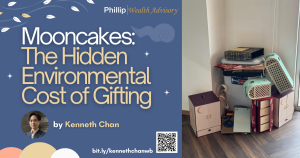Writing a Good Will: Who Should Write a Will (Part 1) May 31, 2024

(This article doesn’t apply to foreigners nor our Muslim friends in Singapore.)
A will goes beyond being a legal document for asset distribution. It is a testament to one’s intentions, values, and legacy. A carefully planned will expresses more than just the monetary value of assets being distributed.
In this 3-part journal series on Writing a Good Will, I will guide you on the importance of having a will in financial planning, what makes a good will, and the considerations for planning a meaningful legacy.
The easiest way to determine if you need a will is to understand what may happen if you pass on without one. Usually, I will start by explaining the Intestate Succession Act (ISA), which serves as the default distribution plan for non-Muslim individuals in Singapore who pass on without making a will. However, given the wealth of online resources available on ISA, I’ll spare you the details here. Instead, I’ll focus more on the non-technical aspect of will writing. Let’s begin by considering which group of people should really consider having a will written.
Who should write a Will?
Individuals aged 21 and above can create their will, yet it is not imperative for everyone to do so upon reaching this age. In my view, certain groups of individuals have more compelling reasons to have their wills written. Let me elaborate why.
1. Becoming a Parent
Firstly, when you become a parent, your own parents are automatically disinherited. According to the default distribution outlined in the ISA, without will, your estate will be divided in two following ways:
- 50% of your estate going to your spouse and 50% to your child(ren), or
- the entire estate going to the child(ren) if your spouse does not survive you
Therefore, if your parents are financially dependent on you, or if there is any strain in the relationship between your spouse and your parents, it may be advisable to have a will to ensure that your parents are provided for.
Secondly, gifting to your children comes with some common concerns:
- Giving too soon when they may not have the financial maturity to handle the wealth
- Giving too much, which may reduce their motivation to strive in life
- Difficulty of managing one real estate property among multiple children
These are the kinds of discussions I have with my clients during consultations. While there is no one-size-fits-all solution, providing recommendations on available tools or insights into how others have navigated similar situations can help my clients make informed decisions. These topics will be covered in the next two parts of this series.
2. Troubled Marriage
It is reasonable to prefer that your assets do not pass to someone with whom you are legally married but emotionally distant. The situation becomes more complex when children are involved.
Even in the case of a legal divorce, the ISA mandates that your entire estate will be inherited by your children. In your absence, your ex-spouse is likely to be the guardian of your children, indirectly overseeing your assets, which may not align with your wishes.
In the unfortunate scenario, where your former spouse remarries and mismanages the funds intended for your children, your children might not have the ability to protect their own interests. Even if they were to pursue legal recourse in the future, there could be little left to recover. In this instance, provisions can be made in the will to safeguard your children’s interests.
3. Health is Ailing
While it is unfortunate if you find yourself in this situation, the positive aspect is that you still have the chance to communicate with your loved ones and address your estate planning needs.
At such a time, estate planning goes beyond just creating a will; you may also want to establish a Lasting Power of Attorney (LPA) and potentially an Advance Medical Directive (AMD). This ensures that instructions are prepared in case the situation deteriorates.
Taking these steps demonstrates your determination to free your loved ones from unnecessary burden. Ultimately, it reflects an act of responsibility and love.
Other Reasons to Write a Will
- Providing for specific individuals: A will allows you to provide for someone or disinherit someone according to your wishes, rather than rely on the default plan under ISA.
- Choosing executors and trustees: You can designate a specific executor/trustee or avoid anyone whom you do not want assuming these roles.
- Naming guardians: If you have minor beneficiaries, you can name a Guardian(s) to act jointly with the surviving parent or to assume guardianship if both parents are not around.
- Ensuring your will is updated: Regularly updating your existing will to ensure it reflects your current intentions and wishes.
- Simplify probate process: By having a will, you provide clear instructions and streamline the probate process for your beneficiaries, and avoid the higher testamentary fees associated with applying for a Grant of Letter of Administration (LOA) when a person passes on without a will.
What kind of assets are not covered by a will?
It is crucial to understand the types of non-probate assets that are not distributed through a will when planning yours:
- CPF monies: The monies in your Ordinary Account, Special Account, Medisave Account, Retirement Account, CPF Life premium balance, along with discounted Singtel shares if any, can only be distributed under CPF nomination.1
- Insurance with nominations: There are generally two types of nominations: revocable or irrevocable. A will can only supersede a revocable nomination. Even so, it is always advisable to revoke the nomination to prevent potential disputes.2
- Joint owned assets: For real estate properties, there are two types of joint ownership: Tenancy -in-common and Joint Tenancy. Tenancy-in-Common holds distinct and separate shares of the property, which enables each owner to designate a beneficiary for their share.3 On the other hand, most jointly owned assets follow the principle of right of survivorship. This means that if one co-owner passes on, his or her portion of the asset automatically transfers to the surviving owner(s) and does not form part of the deceased’s estate for distribution, unless the surviving owner is the sole surviving co-owner.
Can You Avoid the Probate Process?
In my experience, many clients believe that jointly owned or nominated assets eliminate the need for a will. While this approach may seem practical, it raises a critical question: what happens if all joint owners are involved in a common disaster?
Additionally, I came across an insightful article by Lim Fung Peen, a lawyer at Yuen Law, discussing potential complexities related to joint bank accounts in Singapore. In the article, it was highlighted that certain banks in Singapore may not strictly adhere to the survivorship principle and might require a grant before releasing funds.
Furthermore, cases involving beneficiaries fighting in court over jointly owned assets are not uncommon.
Therefore, will can offer clarity, prevent beneficiaries from enduring unplanned probate processes, and enable more robust gifting arrangements if any beneficiaries pass away before the testator.
Conclusion
In this first article of my three-part journal series, I hope I have provided you with a foundational understanding on wills and whether you need one.
Estate planning, in my view, is a frequently overlooked component in everyone’s financial planning. It is my hope that you now recognise that creating a will is not reserved solely for the affluent and encompasses more than just the distribution of assets.
My objective is to support my clients comprehensively in financial planning. If estate planning is the missing piece in your financial puzzle, I can efficiently assist you in finalising your will at a reasonable cost and provide consultations tailored to your financial goals. I will guide you through the process smoothly, ensure a stress-free journey and offer a complimentary revision within the year should your intentions or wishes change.
Stay tuned for my next two series where I will delve deeper into what constitutes a well-crafted will and strategies for creating a meaningful legacy.
Contributor:

Lieu Teck Hua
Wealth Manager
Phillip Securities Pte Ltd (A member of PhillipCapital)
https://bit.ly/TTPlieuth
Reference:
- 1 https://www.cpf.gov.sg/member/infohub/educational-resources/what-does-your-cpf-nomination-cover
- 2 https://singaporelegaladvice.com/law-articles/can-i-distribute-life-insurance-proceeds-by-using-a-will
- 3 https://singaporelegaladvice.com/law-articles/joint-tenancy-tenancy-in-common-change/
Disclaimer
These commentaries are intended for general circulation. It does not have regard to the specific investment objectives, financial situation and particular needs of any person who may receive this document. Accordingly, no warranty whatsoever is given and no liability whatsoever is accepted for any loss arising whether directly or indirectly as a result of any person acting based on this information. Opinions expressed in these commentaries are subject to change without notice. Investments are subject to investment risks including the possible loss of the principal amount invested. The value of the units and the income from them may fall as well as rise. Past performance figures as well as any projection or forecast used in these commentaries are not necessarily indicative of future or likely performance. Phillip Securities Pte Ltd (PSPL), its directors, connected persons or employees may from time to time have an interest in the financial instruments mentioned in these commentaries. Investors may wish to seek advice from a financial adviser before investing. In the event that investors choose not to seek advice from a financial adviser, they should consider whether the investment is suitable for them.
The information contained in these commentaries has been obtained from public sources which PSPL has no reason to believe are unreliable and any analysis, forecasts, projections, expectations and opinions (collectively the “Research”) contained in these commentaries are based on such information and are expressions of belief only. PSPL has not verified this information and no representation or warranty, express or implied, is made that such information or Research is accurate, complete or verified or should be relied upon as such. Any such information or Research contained in these commentaries are subject to change, and PSPL shall not have any responsibility to maintain the information or Research made available or to supply any corrections, updates or releases in connection therewith. In no event will PSPL be liable for any special, indirect, incidental or consequential damages which may be incurred from the use of the information or Research made available, even if it has been advised of the possibility of such damages. The companies and their employees mentioned in these commentaries cannot be held liable for any errors, inaccuracies and/or omissions howsoever caused. Any opinion or advice herein is made on a general basis and is subject to change without notice. The information provided in these commentaries may contain optimistic statements regarding future events or future financial performance of countries, markets or companies. You must make your own financial assessment of the relevance, accuracy and adequacy of the information provided in these commentaries.
Views and any strategies described in these commentaries may not be suitable for all investors. Opinions expressed herein may differ from the opinions expressed by other units of PSPL or its connected persons and associates. Any reference to or discussion of investment products or commodities in these commentaries is purely for illustrative purposes only and must not be construed as a recommendation, an offer or solicitation for the subscription, purchase or sale of the investment products or commodities mentioned.
About the author
Lieu Teck Hua
Wealth Manager
Lieu Teck Hua, a Wealth Manager at Phillip Securities, brings extensive experience in advising on insurance and investment products. Starting as a Remiser in 2009, he swiftly transitioned into a dual-licensed role in financial advisory. With a degree in Finance and certifications as a Chartered Financial Consultant and Associate Estate Planning Professional, Teck Hua is dedicated to providing quality financial advice. He has led seminars on topics like investment portfolio construction and will-writing, empowering over 700 clients with financial literacy.

 Protecting More Than Just Walls: Fire Insurance vs Home Insurance
Protecting More Than Just Walls: Fire Insurance vs Home Insurance  Before the Year Ends: Key Financial Steps for a Confident 2026
Before the Year Ends: Key Financial Steps for a Confident 2026  The ILP Debate: Why Singaporeans Struggle With Financial Product Decisions
The ILP Debate: Why Singaporeans Struggle With Financial Product Decisions  Mooncakes: The Hidden Environmental Cost of Gifting
Mooncakes: The Hidden Environmental Cost of Gifting 






